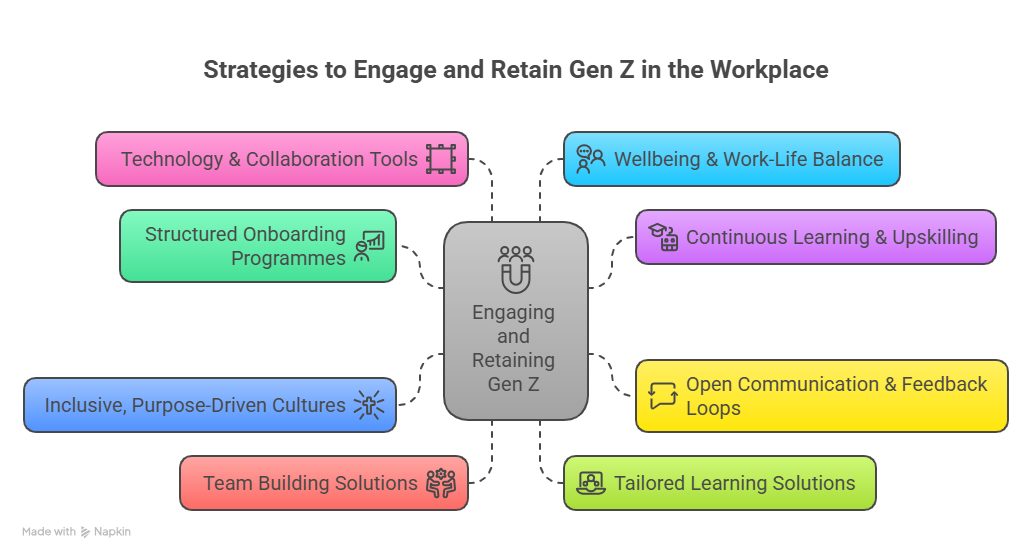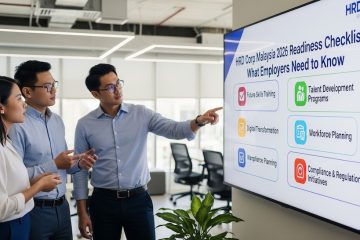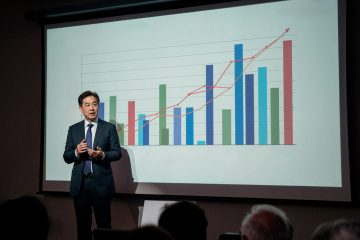Key Takeaways:
- Gen Z prioritises purpose, flexibility, and inclusivity, expecting workplaces that align with their values.
- They thrive in digital-first, feedback-driven environments and prefer fast, collaborative communication styles.
- HR leaders face challenges like bridging generational gaps and managing higher turnover risks effectively.
- Structured onboarding, continuous learning, and tailored team building help integrate and retain Gen Z talent.
- Thriving Talents offers award-winning programmes that strengthen engagement and build future-ready workplaces.

Introduction
Gen Z is stepping into the workplace in bigger numbers than ever, and they’re already changing the way organisations think about work.
Born between the mid-1990s and early 2010s, this generation brings fresh energy, strong digital skills, and very clear expectations about what they want from their careers.
For HR leaders, this isn’t just about managing another age group. It’s about rethinking people-first strategies!
Gen Z looks for flexibility, meaningful career paths, open communication, and workplaces that embrace new technology. In many ways, they’re redefining what the modern workplace should look like.
To get the best out of them, leaders need to understand what drives Gen Z, the challenges they sometimes bring, and the approaches that really click with them.
This guide breaks it all down — from their characteristics and communication style to practical strategies that help organisations engage, integrate, and retain Gen Z talent effectively.
Who is Gen Z in the Workplace?
Gen Z refers to individuals born roughly between the mid-1990s and early 2010s.
Unlike Millennials who entered the workforce during the rise of social media and globalisation, Gen Z has grown up fully immersed in the digital era. Smartphones, social platforms, and instant access to information have been their norm from the start.
This generation entered the workforce during and after the COVID-19 pandemic, which profoundly shaped their career expectations. Remote work, hybrid models, and digital collaboration tools are not novelties to them—they are essentials.
Social change, climate concerns, and economic uncertainty have also influenced how Gen Z defines stability and purpose at work.
How Do They Differ from Millennials and Gen X?
Millennials often value experiences and career flexibility, while Gen Z tends to focus more on stability and financial security due to having grown up in times of economic volatility.
Gen X prioritised independence and a “work to live” mentality, but Gen Z emphasises balance, wellbeing, and aligning personal values with their employers.
Where older generations adapted to technology, Gen Z is digital-first by default. They expect systems and communication to be fast, mobile-friendly, and seamless.
For HR leaders, recognising these distinctions is critical to creating workplaces where Gen Z can thrive, while also ensuring smooth collaboration across multiple generations.
How Does Gen Z Communicate and Work?
If there’s one thing HR leaders quickly notice, it’s that Gen Z communicates differently from previous generations.
They’re digital natives who have grown up with smartphones, social platforms, and instant messaging, and that shapes how they connect at work.
- Digital-first communication: Gen Z prefers short-form, visual, and instant communication via messaging apps, collaborative platforms, or video snippets. Long email threads? Not their style.
- Feedback culture: They thrive on frequent, constructive feedback rather than waiting for annual performance reviews. They want clarity, recognition, and room for improvement—right away.
- Flat structures: Hierarchies don’t resonate with them. They’re more comfortable working in collaborative, team-driven environments where their voices are heard regardless of seniority.
- Team dynamics: Gen Z balances independence with a need for psychological safety. They’re happy to take initiative, but also want reassurance that mistakes are part of learning, not career-ending.
Understanding how Gen Z prefers to connect and collaborate helps HR leaders shape smoother workflows. By meeting them where they are, organisations can unlock their full potential instead of clashing with old-school methods.
Challenges HR Leaders Face with Gen Z Employees
 While Gen Z brings fresh energy, digital skills, and adaptability to the workplace, HR leaders also face unique challenges in managing and retaining them.
While Gen Z brings fresh energy, digital skills, and adaptability to the workplace, HR leaders also face unique challenges in managing and retaining them.
- Managing expectations for flexibility and growth: Gen Z expects hybrid/remote options and fast career progression. Without these, they may disengage or look elsewhere.
- Bridging communication gaps: Different communication styles between Gen Z and older colleagues can lead to misunderstandings or friction in teams.
- Higher turnover risk: If they don’t feel engaged, recognised, or aligned with company values, Gen Z employees are quick to switch jobs.
- Adapting leadership styles: Traditional “command-and-control” models don’t work well. Gen Z responds better to inclusive, empowering leadership that values collaboration.
- Balancing feedback demands: They want continuous feedback, which can be overwhelming for managers unaccustomed to such high-touch engagement.
These challenges aren’t roadblocks. They’re signals for HR leaders to rethink old playbooks. With the right strategies, what looks like a hurdle can actually become an opportunity to unlock Gen Z’s full potential.
Strategies to Engage and Retain Gen Z in the Workplace

Keeping Gen Z engaged goes beyond salary. It’s about growth, culture, and connection. Here’s how HR leaders can create an environment where Gen Z thrives and stays.
Build Structured Onboarding Programmes
Gen Z employees want clarity and guidance from day one.
- Create onboarding journeys that combine company culture, role expectations, and early skill development.
- Use interactive formats like simulations, buddy systems, and onboarding team-building activities.
- Provide “quick wins” in the first 90 days to boost engagement.
Offer Continuous Learning & Upskilling Opportunities
- Gen Z thrives when they see a path for growth. Stagnation = disengagement.
- Provide access to short courses, micro-learning, and leadership development programmes.
- Include AI readiness workshops (AI for Business, AI-powered Presentations, AI as a Second Brain).
- Focus on future-ready skills: digital literacy, innovation, and emotional intelligence.
Explore Training & Workshops and Leadership Development Programmes by Thriving Talents!
Foster Open Communication and Feedback Loops
Gen Z thrives on frequent constructive feedback and open conversations.
- Replace yearly reviews with regular check-ins and feedback cycles.
- Introduce regular check-ins, 180/360-degree reviews and reverse mentoring programmes.
- Encourage open discussions where ideas and questions are welcomed.
Design Inclusive, Purpose-Driven Cultures
This generation is purpose-driven. They want employers aligned with values like sustainability, diversity, and social impact.
- HR leaders must showcase organisational commitment to DEI (diversity, equity, inclusion).
- Position your culture as purpose-driven to build loyalty and retention.
- Deliver clear mission statements, ethical practices, and transparent communication to attract and retain Gen Z talent.
Integrate Team Building Solutions Across Generations
Gen Z wants to feel part of the bigger picture, not just new hires on the sidelines.
- Use evidence-based team building that emphasises collaboration and psychological safety.
- Bridge gaps with cross-generational activities like conflict management, career conversations, and leadership workshops.
- Encourage team-building solutions that focus on real workplace challenges.
- Include conflict management, cross-generational leadership programmes, and career conversations → framed as bridging Gen Z with older colleagues.
Explore Team Building and Engagement Solutions by Thriving Talents!
Create Tailored Learning Solutions for Gen Z Integration
Gen Z employees learn, communicate, and grow differently compared to older generations. They expect:
- Create personalised pathways. Cookie-cutter training doesn’t resonate. They want content that’s directly relevant to their career goals and learning styles.
- Offer practical, tech-enabled learning. As digital natives, they look for workshops that are hands-on and supported by modern tools.
- Provide growth with meaning with training that not only builds skills but also ties into larger career development and purpose-driven work.
At Thriving Talents, we design future-ready programmes that address the unique needs of Gen Z employees while building bridges across generations in the workplace. Our tailored solutions focus on:
- AI Readiness & Digital Skills – Preparing Gen Z for the AI-driven workplace with practical training on generative AI, prompt engineering, and AI-powered tools for communication, productivity, and presentations.
- Cross-Generational Collaboration – Helping Gen Z work seamlessly with Gen X, Millennials, and Boomers through leadership development, conflict resolution strategies, and team synergy models.
- Career Conversations & Retention – Guiding both employees and leaders to have meaningful career conversations, structured feedback sessions, and personalised development plans that reduce turnover.
- Team Building & Engagement – Strengthening collaboration and psychological safety through evidence-based activities that encourage problem-solving, creativity, and inclusion.
Use Technology & Collaboration Tools
Gen Z expects digital-first workplaces with tools that match their style.
- Provide cloud platforms, collaboration apps, and gamified learning experiences.
- Encourage the use of real-time project management tools (e.g., Trello, Asana, Monday.com) for transparency and accountability.
- Adopt mobile-friendly platforms since Gen Z often prefers working and learning on the go.
- Integrate AI-powered productivity tools (chatbots, smart schedulers) to streamline repetitive tasks.
- Support continuous learning with e-learning platforms and bite-sized training modules.
Prioritise Wellbeing & Work-Life Balance
Mental health and flexibility matter deeply to Gen Z.
- Offer flexible work options, wellness programmes, and mental health support.
- Show that employees are valued as people, not just workers.
- Provide access to professional counselling or employee assistance programmes (EAPs).
- Introduce wellness initiatives like mindfulness sessions, fitness memberships, or mental health days.
- Respect boundaries by encouraging healthy digital habits (e.g., no after-hours emails).
- Create safe spaces for open conversations about stress, burnout, and wellbeing.
Supporting Gen Z Graduate Integration in the Workplace
 Gen Z often enters organisations as fresh graduates, making their integration into existing teams especially important. Without structured support, new hires risk feeling disconnected, disengaged, or overwhelmed in their first year.
Gen Z often enters organisations as fresh graduates, making their integration into existing teams especially important. Without structured support, new hires risk feeling disconnected, disengaged, or overwhelmed in their first year.
This is where lessons from initiatives like the MADANI Graduate Scheme (SGM) become valuable. SGM highlights the role of structured onboarding, mentoring, and industry exposure in helping graduates adapt quickly and thrive in corporate environments.
At Thriving Talents, we take this a step further by running long-term Management Trainee Programmes and award-winning development tracks—including consecutive 12-month programmes and 1.5-year development journeys for leading organisations.
For a deeper dive, read our guide: How to Integrate New Graduates Into Your Team: Lessons from the MADANI Graduate Scheme.
Conclusion
Understanding Gen Z in the workplace isn’t just an HR trend but a necessity for future-ready organisations.
This generation is already shaping how businesses recruit, collaborate, and innovate. With their purpose-driven mindset, digital fluency, and demand for inclusivity, they’re raising the bar for what a modern workplace should look like.
For HR leaders, the challenge — and opportunity — lies in designing environments where Gen Z doesn’t just fit in, but thrives.
That means rethinking onboarding, embracing feedback-driven cultures, investing in continuous learning, and building cross-generational bridges through team-building solutions.
The takeaway is simple: if you want your organisation to attract, engage, and retain the best Gen Z talent, you need strategies that go beyond perks and paychecks. You need workplaces that align with their values, encourage growth, and foster collaboration across all levels.
Ready to start? Explore corporate training and development solutions at Thriving Talents to see how you can create a workplace where every generation, including Gen Z, thrives together.


